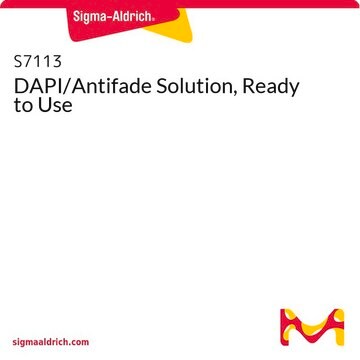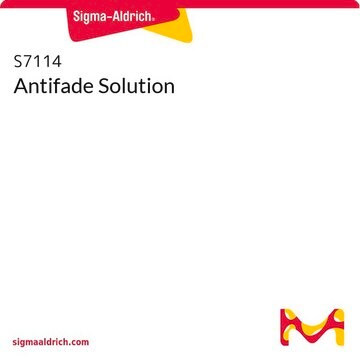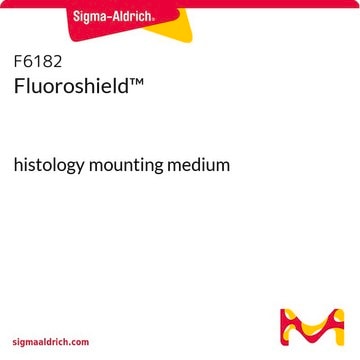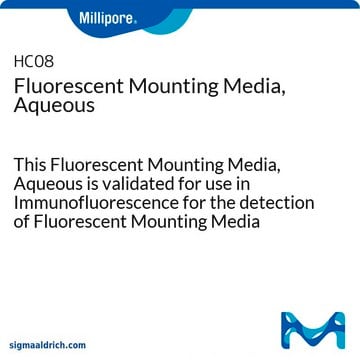MBD0015
4′,6-Diamidino-2-phénylindole dihydrochloride
For Nuclear counterstain in immunoflourecence microscopy, High Content Screening (HCS), Chromosome staining and flow cytometry (FACS)., 1 mg/mL
Synonyme(s) :
2-(4-Amidinophényl)-6-indolecarbamidine dihydrochloride, DAPI dihydrochloride
About This Item
Produits recommandés
Niveau de qualité
Forme
liquid
Conditions de stockage
protect from light
Concentration
1 mg/mL
Technique(s)
transfection: suitable
Solubilité
water: soluble
Fluorescence
λex 340 nm; λem 488 nm (nur DAPI)
λex 364 nm; λem 454 nm (DAPI-DNA-Komplex)
Adéquation
suitable for nucleic acid staining
Conditions d'expédition
dry ice
Température de stockage
−20°C
Chaîne SMILES
Cl.Cl.NC(=N)c1ccc(cc1)-c2cc3ccc(cc3[nH]2)C(N)=N
InChI
1S/C16H15N5.2ClH/c17-15(18)10-3-1-9(2-4-10)13-7-11-5-6-12(16(19)20)8-14(11)21-13;;/h1-8,21H,(H3,17,18)(H3,19,20);2*1H
Clé InChI
FPNZBYLXNYPRLR-UHFFFAOYSA-N
Vous recherchez des produits similaires ? Visite Guide de comparaison des produits
Catégories apparentées
Description générale
Application
DAPI is several times more sensitive than ethidium bromide for staining DNA in agarose gels. It may be used for photofootprinting of DNA, to detect annealed probes in blotting applications by specifically visualizing the double-stranded complex, and to study the changes in DNA and analyze DNA content during apoptosis using flow cytometry. DAPI staining has also been shown to be a sensitive and specific detection method for mycoplasma.
For Nuclear counterstain in immunoflourecence microscopy, High Content Screening (HCS), Chromosome staining and flow cytometry (FACS).
Actions biochimiques/physiologiques
Caractéristiques et avantages
- Ready-to-use liquid, cell permeable dye.
- Can be used with live cells and fixed cells.
- Effective for fixed-cell staining and quantitation of DNA content.
- Optimal Counterstain when using fluorescent antibodies during fluorescence microscopy or high-content screening (HCS) applications.
Forme physique
Mention d'avertissement
Warning
Mentions de danger
Conseils de prudence
Classification des risques
Skin Sens. 1
Code de la classe de stockage
12 - Non Combustible Liquids
Classe de danger pour l'eau (WGK)
WGK 1
Point d'éclair (°F)
Not applicable
Point d'éclair (°C)
Not applicable
Certificats d'analyse (COA)
Recherchez un Certificats d'analyse (COA) en saisissant le numéro de lot du produit. Les numéros de lot figurent sur l'étiquette du produit après les mots "Lot" ou "Batch".
Déjà en possession de ce produit ?
Retrouvez la documentation relative aux produits que vous avez récemment achetés dans la Bibliothèque de documents.
Les clients ont également consulté
Notre équipe de scientifiques dispose d'une expérience dans tous les secteurs de la recherche, notamment en sciences de la vie, science des matériaux, synthèse chimique, chromatographie, analyse et dans de nombreux autres domaines..
Contacter notre Service technique












